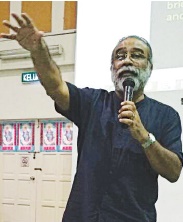Oct 2017
After PMPC IV, Holy Spirit Cathedral holds a study day
“The Church has always felt the need for change and inclusivity since the time of the Apostles, when the first Council at Jerusalem was called by St Paul on the issue of circumcision,” said Fr Fabian Dicom.
“Later, Rome had to respond to various issues, in a Church encompassing different cultures, languages and peoples in a changing world,” he added, during the Study Day at the Cathedral of the Holy Spirit on Sept 9, to rediscover the soul of the parish and to refocus and see what they wanted their parish to be like in the next 10 years and beyond..
“The mission of Jesus is primarily entrusted to the Holy Spirit and, therefore, we are assured of continuity in the Church,” said Bishop Sebastian Francis in his opening address. It does not matter if some of us might not be around in 2026 to participate in the next PMPC. That should not stop us from planning and taking full responsibility for the future of the Church. “What is the Holy Spirit saying to the Church today? That is the fundamental question. So we come together to dialogue, discern and move into action,” he added.
The Prelate spelt out 12 points taken from the Scriptures to describe the vision of the Church, guided by three principles namely:
a) Purity of intention,
b) Faith in prayer and
c) Fidelity in action.
Without the personal conversion of the leaders, there could be no true vision and reform. He concluded, saying that we should be Christ-centred.
Since the Aggiornamento in 1976, eight needs were identified and reaffirmed at the Synod at St Anne’s Church.
The Core Need is the Basic Ecclesial Community (BEC).
The Pastoral Needs are:
a) Unity,
b) Formation,
c) Integral Human Development,
d) Ecumenical and Interreligious Dialogue,
e) Youth,
f) Family, and
g) Social Communications.
The next speaker, Deacon Clement said that they received more than 7,000 responses to the questionnaire that had been given to all Catholics in the Diocese in December 2015. At the Synod workshops of the respective Arch/ dioceses, the inputs from the questionnaires were analysed and synthesised in preparation for the PMPC IV.
Fr Jude Miranda, Chairman of the PMPT, revisited PMPC IV, saying that there was only one keynote address by the Arch/bishops, but it had three dimensions:
a) a need to be creative,
b) inclusive and
c) bridge-builders.
Of greatest concern were Islamisation, globalisation, secularisation and corruption. He also referred to the eight challenges mentioned by Dr Francis Low: the new poor, small politics, youth, education, foreign labour, labour movement, dialogue and the Bumiputra majority church.
The last speaker, Mr Ramesh, said that PMPC IV was acclaimed as a new Pentecost which moved everyone towards mission. We are called to be missionary disciples of hope with renewed vision and mission in a changing world. We cannot be content within the walls of the church.
At the conclusion of the Study Day, Fr Fabian, who was the coordinator, assured the participants that the Animating Team would return to provide support and help chart a direction for the parish in preparation for the CHS Parish Pastoral Assembly on 3 December.
This was the first roadshow conducted by the Penang Diocesan Animating Team, to explain the purpose and processes of the Penang Diocesan Synod at the Church of St Anne, Bukit Mertajam and leading up to the PMPC IV (Peninsular Malaysian Pastoral Convention) at Plentong, Johor.
After Vatican Council II and Federation of Asian Bishops’ Conferences (FABC), the Peninsular Malaysian Church followed up with the Aggiornamento, Diocesan Assemblies, RPPs, PMPC I, II, II and finally PMPC IV in 2016.
Article reproduced from Herald Malaysia online


